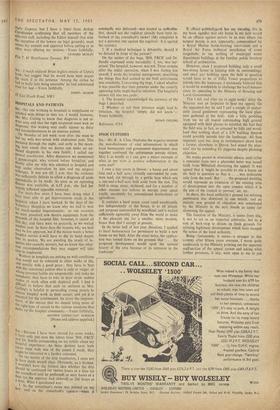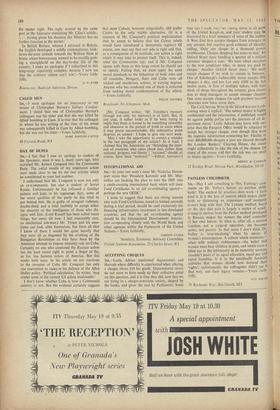IPSOS CUSTODES
SIR,--Mr. R. A. Cline illustrates the negative manner (by non-disclosure of vital information) in which local bureaucrats and government departments may together confound the unfortunate private citizen. May I. as briefly as I can, give a minor example of what in my vi:w is positive collaboration to the same end?
I own a tiny estate in Devon : a house and about four and a half acres virtually surrounded by com- mon land, cut through by a public lane which sets a one-and-a-half-acre field aside from the rest. The field is steep, stony, sheltered, and for a number of other reasons too tedious to occupy your space totally unsuitable for conventional horticulture or agriculture.
It contains a hard tennis court rated exorbitantly but independently of the house, is to all intents and purposes surrounded by woodland, and is tucked sufficiently agreeably away from the world to make it the pleasant site for a smaller, more modern, house than that I occupy at present.
In the latter half of last year, therefore, I applied to local bureaucracy for permission to build a new house on my field. After the usual delay, the applica- tion was turned down on the grounds that '. . . the proposed development would spoil the natural beauty of the area because of its intrusion in the landscape If official gobbledygook has any meaning, this in my book signifies that any house in my field would be an offence against nature, in an area where the natural beauty is not, apparently, compromised by a Royal Marine battle-training reservation and a Royal Air Force technical installation of some magnitude, to say nothing of municipal water department buildings in the familiar public lavatory school of architecture.
However, since I proposed building only a small two-storey house in keeping with its surroundings;
and since any building upon the field in question would have to be of Eiffel Tower proportions to
intrude into the landscape, I mistakenly believed that it would be worthwhile to challenge the local bureau- cracy by appealing to the Ministry of Housing and Local Government.
This I did, and after six or eight weeks' delay the Ministry sent an Inspector to hear my appeal. On the appointed day he and I and a couple of elabor- ately casual gentlemen representing the local plan- ners gathered at the field: with a little prodding from me we all toured surrounding high ground equipped with field glasses to establish the fact that the field was, in fact, so screened by hills and wood- land that nothing short of a UN building thereon could possibly intrude into the landscape. All then departed• save me. deep in reminiscence about how a farmer, elsewhere in Devon. had wiped the plan- ners' eye by extending his piggeries despite planning objection. . . .
Six weeks passed in ministerial silence, until (after a reminder from mc) a photostat letter was issued forth from Whitehall dismissing the appeal. It was agreed that it 'might be possible to site a house on the field in question so that it . . . was noticeable
only from the road.' But '. . . the proposed dwelling would represent an extension of the existing area of development into the open country which it is the aim of the council to prevent,' etc. etc.
In short, the local authority's ground for refusing permission was dismissed in one breath• and an entirely new ground of objection was substituted by the Ministry in the next breath as cause for dismissing the appeal.
The function of the Ministry, it seems from this, is not to act as an impartial arbitrator, but as a
sort of back-stop to dream up fresh grounds for refusing legitimate development which have escaped the notice of the local authority.
Being --fortunately, it stems—a stranger to this country after fifteen years overseas, I wrote quite moderately to the Ministry pointing out the apparent malfunction of the appeal system and asking what further processes, if any, were open to me to put
the matter right. The reply arrived by the same post as the Spectator containing Mr. Cline's article: . . having given his decision the Minister has no further function in the matter.'
In British Borneo, whence I returned to Britain, the English developed a mildly contemptuous, look- down-the-nose attitude towards the Welfare State at home, where bureaucracy seemed to be steadily gain- ing a stranglehold on the day-to-day life of the country. I make no apologies if I subscribed to this long-range superiority complex, because I now see that the ordinary citizen can't win!—Yours faith- fully, Btaentiray, &Neigh Salterton, Devon
G. W. KERR







































 Previous page
Previous page